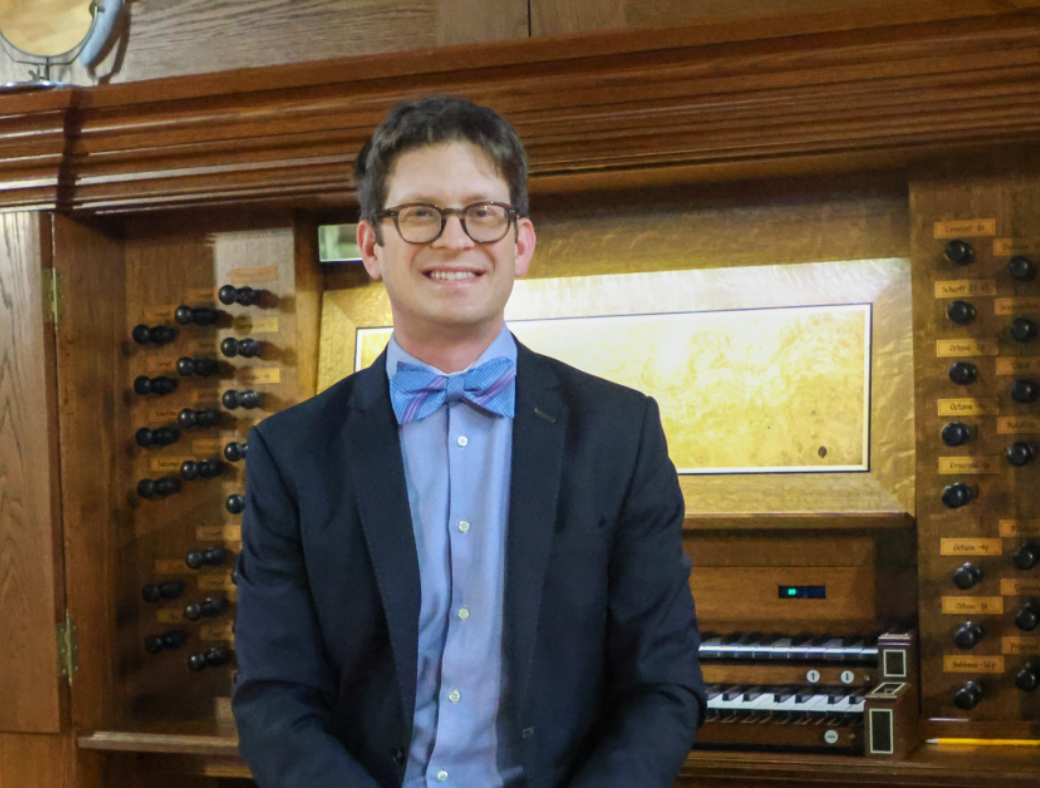Providing Gift of Music and Serenity to Community
By Autumn Meyers | NWI.LIfe
The Poor Handmaids of Jesus Christ recently added a stunning new organ to its Ancilla Domini Chapel. On Sunday, April 30, the Poor Handmaids held its very first organ recital to celebrate this wonderful addition. People from all over the community gathered for a one-of-a-kind organ concert and were left absolutely speechless.
The new organ was handcrafted by Taylor and Boody Organ builders in Virginia and completed on March 3. A blessing service for the new instrument was held on March 25, but a recital was the perfect choice to showcase the organ to the public.
The recital featured none other than Balint Karosi, a concert organist who specializes in playing these types of organs and has performed throughout the United States and Europe. Karosi is well-known for his ability to interpret music and bring it to life in the most unique, touching way. The Poor Handmaids’ Director of Liturgy and Music, Andrew Jennings, knew he had to get Karosi to play the first recital.
“When playing this type of instrument, making good music is about so much more than just being accurate and hitting the right notes. This organ is unique because, unlike other organs, the wind is unstable and noncontinuous. It pumps and breathes as you play it, so you have to know how to listen to the organ and feel how it’s breathing, and Balint is just incredible at it. The music just pours from him,” said Jennings.
Karosi was honored to play such a breathtaking instrument and demonstrate its beauty to the community for the first time.
“It’s craftsmanship respects centuries of traditions for organ building. This organ is going to last hundreds of years because it’s made with traditional materials. It’s a high-quality, handcrafted organ, which cannot be said about a lot of organs in the United States. This is an instrument that Johann Sebastian Bach himself could have sat down at and would have felt immediately at home,” said Karosi.
Karosi played mostly classical German music in honor of the Poor Handmaids and their German origins, but he played a few modern pieces as well. Everyone loved it. As people swayed and bowed their heads, soaking in the music, it became clear that the new organ is more than just an instrument. It’s a powerful, spiritual tool.
“Spiritual well-being is a big part of the Poor Handmaids’ mission, and regardless of a person’s faith or background, there’s sort of a transcendental moment that a person can have in a space like this. As you listen to the music it turns into a very sensory experience and allows you to feel outside of yourself and feel that bigger thing, whatever that may be. We always want to make this space free to the public so they can experience it,” said Jennings.
What also makes this organ so special is that it is literally a part of the Poor Handmaids of Jesus Christ campus. All of the carvings on the organ were made from the wood of a Linden tree that stood in the heart of the campus. The tree had to be cut down for safety issues, and the Sisters thought it would be a wonderful way to keep its memory alive.
“That tree was planted here and grew here, and it’s going to remain here forever. From a spiritual perspective, it gives you that sense that all creation says glory to God,” said Jennings.
It’s ultimately incredible that such a breathtaking instrument resides right here in Northwest Indiana. Most organs this beautiful are commonly found in Europe and have been there for hundreds of years. The fact that the Poor Handmaids now have one should not be overlooked.
“If you want to spare yourself a trip to Europe to hear a European organ, all you have to do is come here. You will hear the same sounds that you would hear on an organ in Europe that is hundreds of years old. It’s wonderful to bring those sounds right here to the middle of Indiana,” said Karosi.
The Poor Handmaids of Jesus Christ are proud of their new instrument and can’t wait for the community to experience if for themselves.
“This is a gift to the community. Our campus is a place of spiritual nourishment, and we want people to come out and experience this new instrument, even if it’s not for recitals. I’m hoping to encourage more people to come to play the instrument just for their own gratification. If students in the area want to come and practice or get lessons, I want to encourage them to do so,” said Jennings.

